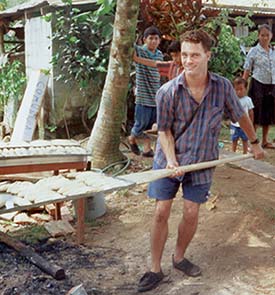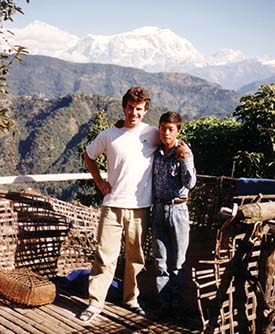 |
 |
| current issue |  |
past issues |  |
send a letter/news |  |
address update |  |
advertise |  |
about us |  |
alumni home |
|
After the Peace Corps UNH faculty members have stories to tell and careers that took root in distant lands Charlie French ~ Panama
Charlie French '08G was alone in a small hut, deep in the Panamanian rainforest, when the rapping started. He opened the door. Nothing. Then it started in again, sharp and insistent, and that's when he saw it—a giant fer-de-lance, one of the world's most venomous snakes, was coiled on his porch. It was ready to strike. And it was big. "Five feet long and wide as my leg," says French, who doesn't even like garter snakes much. His cries for help brought the villagers running to his rescue, and today the story is a favorite among French's students, who love hearing about his time in the Peace Corps. "The way I teach exposes students to what you can do that's different from the traditional career path," says French, an associate professor of community development for UNH's Cooperative Extension. Of course it's not the poisonous snakes—or the flesh-eating parasites or any of French's other skin-tingling tales—that get students thinking about devoting two years of their lives to the Peace Corps. "It's the opportunity to discover your own strength," says French, noting that about a half dozen of his students have become volunteers (including Brendan Callahan '10, featured on page 32). In 1995, when French arrived in Panama, his mission was to educate farmers about sustainable agriculture. But the first thing the locals did was teach him to swing a machete so he could work alongside them as they slashed their way through the forest, searching for new soil. "It was hard," he says, "because I was there to help save the rainforest. But they needed to know that I understood their way of cultivating the land, which had been going on for generations. I needed to earn their trust." Eventually, French was able to show them how to use terracing to prevent erosion and how ot use legume plants to help fix nitrogen in the soil. He also taught them to build clay ovens, reviving one of their own traditions that had been lost with the coming of Western civilization."It was perfect preparation for my current job," says French, who, along with teaching, is also a team leader for the Cooperative Extension's Community and Economic Development Program. "It sounds just like a Peace Corps position," he says, "with a focus on leadership, community decision-making, and entrepreneurial efforts." For French, it's a perfect fit: community development work that's making a difference—and there are no giant snakes to be seen. David Laflamme ~ Nepal
In 1996, kneeling beside a small stream in the mountains of Nepal, David Laflamme got a sobering lesson about the need for public health education. "It sounds gross—and it is," says the research assistant professor in UNH's health management and policy department, "but the stream water used for drinking in that community was the same water that was used to dispose of human waste." Laflamme, who was assigned to Nepal as a "district sanitation coordinator" when he joined the Peace Corps, jokes that he thought he'd be working as a garbage man. "But what they needed, obviously, was health education," he says. "Waterborne diseases were a huge deal." When one of the villages had its first spigot installed and connected to a clean water source, Laflamme and a team of locals he trained to help him explained the basics of clean drinking water: how to collect the water in containers, how to wash those containers, and the importance of clean hands. As spigots were installed in other communities, Laflamme, an avid climber, got plenty of exercise making his way from village to village among the world's tallest mountains. Later, he worked with locals to evaluate each project and report on the health benefits, which were typically immediate and dramatic. Today, Laflamme, who serves as the maternal and child health epidemiologist for the state of New Hampshire and also teaches a class at UNH on evaluation in public health, is constantly looking at data gathering as a means to improve public health. "My affinity for community-based participatory research came directly from my time in Nepal," he says. "It was so clear how much richer the result is when you work with locals, rather than having academics come in and tell people how to do things." Living in Nepal was tough. "Kind of like endless camping, with lots of nasty infectious diseases thrown in," Laflamme says. "But I'd do it again in a heartbeat." Along with valuable career development came a new perspective on the world. "Even now, every day, I look around and say to myself, This is not how most of the people in the world live. This awareness doesn't come with travel," he says. "It comes with living somewhere else and becoming part of a community." It comes from being in the Peace Corps. ~
|
blog comments powered by Disqus



